Lhasa
Potala
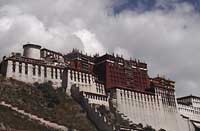 In his book 'Seven Years in Tibet', describing his epic trip to Lhasa in the forties, Heinrich Harrer writes of Lhasa "and no goal is more attractive to the explorer than the Dalai Lama's home". And that home is, or at least was the Potala. Now it has more a feel of a museum rather than the seat of an ancient power. It is architecturally splendid, climbing up the side of a hill with imposing brick built sides, white washed and burgundy and gold on the roof. The climb up is exhausting and then we pay and it distresses me to think where the money will go to, Chinese pockets no doubt. As we shuffle though the rooms, throngs of Tibetan pilgrims jostle around us. Young men eagerly pushing through, old women spinning their prayer wheels constantly murmuring their mantra 'om mani padme hum'. Many have a wad of rancid yak butter in a yellow plastic sheaf, scooping a dollop out onto the candle lamps burning in the chapels. We walk into the Dalai Lama's private apartment. An old monk sits cross-legged in the corner quietly chanting prayers from the wood block printed prayer sheets in front of him. I look at him and give him a knowing smile and he smiles back at me. He leaves his praying and tells me about the room in Tibetan. I am able to pick out some of the names of the deities, and then he says the words 'Dalai Lama' and counts out 14 on his hands. The fourteenth incarnation of the Dalai Lama is the present leader, in exile in India. I nod sagely. 'Shhhh, Dalai
In his book 'Seven Years in Tibet', describing his epic trip to Lhasa in the forties, Heinrich Harrer writes of Lhasa "and no goal is more attractive to the explorer than the Dalai Lama's home". And that home is, or at least was the Potala. Now it has more a feel of a museum rather than the seat of an ancient power. It is architecturally splendid, climbing up the side of a hill with imposing brick built sides, white washed and burgundy and gold on the roof. The climb up is exhausting and then we pay and it distresses me to think where the money will go to, Chinese pockets no doubt. As we shuffle though the rooms, throngs of Tibetan pilgrims jostle around us. Young men eagerly pushing through, old women spinning their prayer wheels constantly murmuring their mantra 'om mani padme hum'. Many have a wad of rancid yak butter in a yellow plastic sheaf, scooping a dollop out onto the candle lamps burning in the chapels. We walk into the Dalai Lama's private apartment. An old monk sits cross-legged in the corner quietly chanting prayers from the wood block printed prayer sheets in front of him. I look at him and give him a knowing smile and he smiles back at me. He leaves his praying and tells me about the room in Tibetan. I am able to pick out some of the names of the deities, and then he says the words 'Dalai Lama' and counts out 14 on his hands. The fourteenth incarnation of the Dalai Lama is the present leader, in exile in India. I nod sagely. 'Shhhh, Dalai 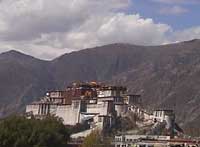 Lama' he whispers again. He thinks I am American, and I set him straight. Then he calls me over and clasps my hands, mumbling at me, so I went 'om' back to him. I bowed and said 'Dalai Lama' and pointed at myself and whispered 'Dharamsala', the place in India where he lives in exile, 'I have been'. I tried to show my solidarity in facial and hand gestures- hey, I've even met the Dalai Lama. (This always makes me laugh when I hear Western travellers waxing lyrical on how spiritual they are, how in tune with Tibetan Buddhism they are, and how they have met with the Dalai Lama. He is a busy man, and getting a private audience with him is time consuming and not the easiest thing. However, he regularly gives public audiences where masses of Tibetans and Westerners alike throng and queue up to 'meet' the big man himself. The meeting consists of little more than a shake of the hands and maybe a word, but the queue is very long behind you, and a smile is all you get from this awesome character with tremendous presence. And afterwards an aide hands over a red string with a knot in it and that is it. The old monk puts his fingers to his lips, 'solidarity brother' I am thinking and I put my hands together as if in prayer and bow. I walk away and as I do so a fat Chinese tourist with a necklace of Canon hardware wanders into the room, clicking with no reverence. Behind his back I pull an ugly face, motioning it at the fat Chinese man and the monk pulls a knowing smile and nods and strangely starts slapping his shaved head. Weird!
Lama' he whispers again. He thinks I am American, and I set him straight. Then he calls me over and clasps my hands, mumbling at me, so I went 'om' back to him. I bowed and said 'Dalai Lama' and pointed at myself and whispered 'Dharamsala', the place in India where he lives in exile, 'I have been'. I tried to show my solidarity in facial and hand gestures- hey, I've even met the Dalai Lama. (This always makes me laugh when I hear Western travellers waxing lyrical on how spiritual they are, how in tune with Tibetan Buddhism they are, and how they have met with the Dalai Lama. He is a busy man, and getting a private audience with him is time consuming and not the easiest thing. However, he regularly gives public audiences where masses of Tibetans and Westerners alike throng and queue up to 'meet' the big man himself. The meeting consists of little more than a shake of the hands and maybe a word, but the queue is very long behind you, and a smile is all you get from this awesome character with tremendous presence. And afterwards an aide hands over a red string with a knot in it and that is it. The old monk puts his fingers to his lips, 'solidarity brother' I am thinking and I put my hands together as if in prayer and bow. I walk away and as I do so a fat Chinese tourist with a necklace of Canon hardware wanders into the room, clicking with no reverence. Behind his back I pull an ugly face, motioning it at the fat Chinese man and the monk pulls a knowing smile and nods and strangely starts slapping his shaved head. Weird!
The Potala complex is vast and we take several hours walking through it. I am puzzled at the huge, elaborate stapes, dripping in gold and precious stones that house the relics of previous Dalai Lamas, for are Tibetan Buddhists not of the belief that death is the gateway to rebirth and therefore the body is to be disposed of. Thus they should have sky burial sites where the eagles devour the broken up bones of the deceased? So I am thinking something like that, looking at this enormous gold Stupa which looks everything like an object of attachment and desire and most un-Buddhist when a Chinese tour guide waving her yellow flag pushes me to one side and starts loudly babbling about what the miserable looking tourists that follow her are looking at. They nod and point and shoot. No reverence again, I think to myself. No respect. Time to leave the Potala to its memories of pomp and splendour and glory, now reduced to a photo opportunity for the Chinese hordes who think it is theirs.
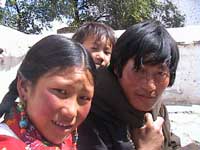 Before descending down the long slope to the exit, Lindsey and I sit near the entrance to the Potala, watching the world go by. I look over the wall across Lhasa. A tremendous vista with mountains all around and the city stretching outwards. From here we can see quite how small the Tibetan area is, and how Chinese Lhasa has been branded. Dare I say those words blue glass and bathroom tile cladding again? Below us, at the foot of the Potala is a pond and it has been turned into a boating lake. The Chinese like their boating lakes. In the far side of the pond is a Ferris wheel and a fairground and I reflect on how out of keeping this is with the character of Potala whose shadow it sits in. But this matters little to the Chinese. In front of the Potala they have erected a hideous tall pillar with writing in Mandarin, topped with a gold star, surrounded by soviet style triumphant statues, all glorifying the Party and the People no doubt. Pilgrims shuffle past us. We sit and watch. An old lady moves away from the pilgrims and sits next to us. She wears, as does almost every Tibetan woman, a pinafore made up of ten centimetre wide strips of horizontally striped cloth stitched together. Hers is in muted colours of yellow, brown, blue and black. She's wearing a white floppy hat that casts a shadow over her dark brown curious eyes. Her dress is brown and her blouse is mauve silk with Chinese patterns embroidered on it. The commonality of the pinafore on Tibetan women is matched by their obsession with turquoise and coral and this woman is no exception with jewellery made from them. On her feet are heavy black leather boots that look out of keeping with the rest of her feminine attire. She has clearly dressed up in her finest for her trip to the Potala. She has a maternal, grandmotherly aura to her. And this is reflected in her next action. She takes some apples from a bag and hands us a couple. Full of typical English reserve we refuse, but she insists and we take the apples. I take my penknife from our bag and start peeling them. She is intrigued and points at my left hand. She finds it amusing and strange that I am using my left hand. Later, when she sees me writing notes using my cack hand she cannot control her pointing and elderly giggling and draws a crowd of innocent beady eyes all gawping at the freak using his left hand. But that was later, first she took my knife and peeled her apple and all three of us sat munching on delicious apples looking up at the imposing whitewashed walls of the Potala. The method of whitewashing deserves a mention. Rather than using a paintbrush and pot, the Tibetans paint their monasteries by taking a bucket of paint and scooping it out using a large ladle. With a flick of the arm the contents of the ladle is flung at the wall, coating it in paint. The coat is consequently uneven with thick dribbles. Even more paint seems to land away from the wall and it is with great care you must negotiate your way around Tibetan painter-decorators if you want to avoid getting whitewashed yourself.
Before descending down the long slope to the exit, Lindsey and I sit near the entrance to the Potala, watching the world go by. I look over the wall across Lhasa. A tremendous vista with mountains all around and the city stretching outwards. From here we can see quite how small the Tibetan area is, and how Chinese Lhasa has been branded. Dare I say those words blue glass and bathroom tile cladding again? Below us, at the foot of the Potala is a pond and it has been turned into a boating lake. The Chinese like their boating lakes. In the far side of the pond is a Ferris wheel and a fairground and I reflect on how out of keeping this is with the character of Potala whose shadow it sits in. But this matters little to the Chinese. In front of the Potala they have erected a hideous tall pillar with writing in Mandarin, topped with a gold star, surrounded by soviet style triumphant statues, all glorifying the Party and the People no doubt. Pilgrims shuffle past us. We sit and watch. An old lady moves away from the pilgrims and sits next to us. She wears, as does almost every Tibetan woman, a pinafore made up of ten centimetre wide strips of horizontally striped cloth stitched together. Hers is in muted colours of yellow, brown, blue and black. She's wearing a white floppy hat that casts a shadow over her dark brown curious eyes. Her dress is brown and her blouse is mauve silk with Chinese patterns embroidered on it. The commonality of the pinafore on Tibetan women is matched by their obsession with turquoise and coral and this woman is no exception with jewellery made from them. On her feet are heavy black leather boots that look out of keeping with the rest of her feminine attire. She has clearly dressed up in her finest for her trip to the Potala. She has a maternal, grandmotherly aura to her. And this is reflected in her next action. She takes some apples from a bag and hands us a couple. Full of typical English reserve we refuse, but she insists and we take the apples. I take my penknife from our bag and start peeling them. She is intrigued and points at my left hand. She finds it amusing and strange that I am using my left hand. Later, when she sees me writing notes using my cack hand she cannot control her pointing and elderly giggling and draws a crowd of innocent beady eyes all gawping at the freak using his left hand. But that was later, first she took my knife and peeled her apple and all three of us sat munching on delicious apples looking up at the imposing whitewashed walls of the Potala. The method of whitewashing deserves a mention. Rather than using a paintbrush and pot, the Tibetans paint their monasteries by taking a bucket of paint and scooping it out using a large ladle. With a flick of the arm the contents of the ladle is flung at the wall, coating it in paint. The coat is consequently uneven with thick dribbles. Even more paint seems to land away from the wall and it is with great care you must negotiate your way around Tibetan painter-decorators if you want to avoid getting whitewashed yourself.
Circuits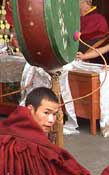
We follow the pilgrims round the Barkhor, doing a kora, going clockwise around the Jokhang as is customary when walking around Tibetan religious monuments. This is the high point for Tibetan Buddhists, something like arriving in Mecca for Muslims. People from all over the country converge, all under the watchful eye of the ever present, but subtle Chinese police. Some pilgrims are hardcore, prostrating as they go round, others are in a daze of 'om mani padme hum' swirling their prayer wheels around. A few make a big deal of their prostrations; with leather aprons and wooden blocks in their hands and knees, they fling themselves arms outstretched onto the cobbles, sliding along on the leather as though it were a toboggan. More often than not these prostrators will stop to beg alms. To gain favour they are easily given; Harrer wrote of his stay in Tibet that beggars could earn more than workers.
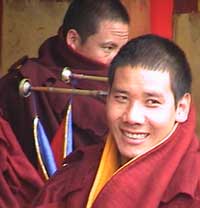 The Barkhor surrounds the Jokhang and we enter it, avoiding the officious looking Chinese man collecting entry fees. The monks wave us in, unhindered. It is almost medieval. Devout pilgrims walk round the central chapel, spinning prayer wheels on the circuit as they go. Inside the main chapel it is dark and smells of yak butter and dozens of rats scamper across the floor in front of us. In the main courtyard monks are praying, banging drums, blowing pipes and horns and it is a cacophony of noise, but not altogether unpleasant. We stand and watch and a crowd grows. A fat precocious Chinese child of maybe ten years tugs at my sleeve. He is playing a hand held video game that bleeps and distracts my attention from the monks. He wants me to look at the game, but it annoys me and it begins to drown out the monks chanting with this bleep bleep buzzzzzz. And then I lose my temper (and probably all the favour I'd amassed by being in this holy place) and shun him away with a very English "piss off you little shit".
The Barkhor surrounds the Jokhang and we enter it, avoiding the officious looking Chinese man collecting entry fees. The monks wave us in, unhindered. It is almost medieval. Devout pilgrims walk round the central chapel, spinning prayer wheels on the circuit as they go. Inside the main chapel it is dark and smells of yak butter and dozens of rats scamper across the floor in front of us. In the main courtyard monks are praying, banging drums, blowing pipes and horns and it is a cacophony of noise, but not altogether unpleasant. We stand and watch and a crowd grows. A fat precocious Chinese child of maybe ten years tugs at my sleeve. He is playing a hand held video game that bleeps and distracts my attention from the monks. He wants me to look at the game, but it annoys me and it begins to drown out the monks chanting with this bleep bleep buzzzzzz. And then I lose my temper (and probably all the favour I'd amassed by being in this holy place) and shun him away with a very English "piss off you little shit".
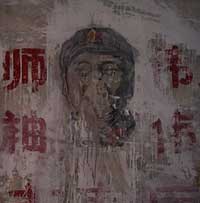 Our sightseeing took us to Drepung monastery, once one of the largest in the world, now reduced to a fraction of its monk population by the Chinese. Near the entrance a prayer wheel was connected to an elaborate water mill mechanism, allowing it to be powered by the fast flowing stream that ran by the side of the monastery. Automatic prayers I mused. We entered a room and there was Chinese graffiti on the walls and a stencil of Mao, reminding us of the Chinese imperialism and cultural genocide that he instigated in Tibet. The place felt empty, with few monks in sight. They were all elsewhere it transpired, mostly in the debating courtyard, a sea of burgundy robes and shaved heads and much noise. In groups of three to six one monk would stand above his cross legged peers and argue a point. At the punch line of his point he would swing his arm round and with a 'stick that in ya pipe an' smoke it big boy' flourish slap his hands together. The cross legged monks would murmur and give him a 'yeah', 'but you've forgotten about that you fool' and the flourishing monk would have to come up with a new argument to counter theirs, finishing it with an almighty slap again. With over two hundred monks in the courtyard there was some serious slapping going on. If you didn't know you were in a Tibetan Monastery, from behind the wall it would be quite easy to assume it was something else less salubrious occurring.
Our sightseeing took us to Drepung monastery, once one of the largest in the world, now reduced to a fraction of its monk population by the Chinese. Near the entrance a prayer wheel was connected to an elaborate water mill mechanism, allowing it to be powered by the fast flowing stream that ran by the side of the monastery. Automatic prayers I mused. We entered a room and there was Chinese graffiti on the walls and a stencil of Mao, reminding us of the Chinese imperialism and cultural genocide that he instigated in Tibet. The place felt empty, with few monks in sight. They were all elsewhere it transpired, mostly in the debating courtyard, a sea of burgundy robes and shaved heads and much noise. In groups of three to six one monk would stand above his cross legged peers and argue a point. At the punch line of his point he would swing his arm round and with a 'stick that in ya pipe an' smoke it big boy' flourish slap his hands together. The cross legged monks would murmur and give him a 'yeah', 'but you've forgotten about that you fool' and the flourishing monk would have to come up with a new argument to counter theirs, finishing it with an almighty slap again. With over two hundred monks in the courtyard there was some serious slapping going on. If you didn't know you were in a Tibetan Monastery, from behind the wall it would be quite easy to assume it was something else less salubrious occurring.
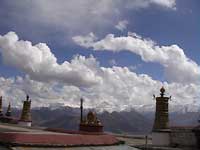 The Tibetans give you plenty of opportunities to part with your cash. No more so than on the Barkhor with a multitude of stalls selling trinkets and jewellery and clothes and anything and everything else. We bumped into Melanie who was getting carried away, seemingly buying all the reserves of turquoise not already being worn by Tibetan ladies. For some inexplicable reason Lindsey decided she wanted a pair of traditional Tibetan boots (and when buying souvenirs we must not forget the baby jacket) and we bought them, handing our money over in two hands as is customary here. The stall owners then take the cash and touch every item on their stall with it, for good luck in the hope that once the objects feel money it will make them more eager to be sold.
The Tibetans give you plenty of opportunities to part with your cash. No more so than on the Barkhor with a multitude of stalls selling trinkets and jewellery and clothes and anything and everything else. We bumped into Melanie who was getting carried away, seemingly buying all the reserves of turquoise not already being worn by Tibetan ladies. For some inexplicable reason Lindsey decided she wanted a pair of traditional Tibetan boots (and when buying souvenirs we must not forget the baby jacket) and we bought them, handing our money over in two hands as is customary here. The stall owners then take the cash and touch every item on their stall with it, for good luck in the hope that once the objects feel money it will make them more eager to be sold.
Before we left Lhasa we took Onedoi out for a meal as a gesture of thanks for driving us here. All the hotels are Chinese; no western hotel chains will touch Tibet. Holiday Inn had a hotel here, Hotel Lhasa, but they packed their bags several years ago. Still, this seemed to be the pick of the bunch, despite now being in Chinese hands. Surely they'd remember a thing or two about western cooking. After ten days of grease and rice and chop sticks we wanted to give Onedoi a taste of our cuisine. His wife and her sister joined us. The menu was uninspiring and expensive. The restaurant was dull with grubby dating decor and this was a luxury hotel in history only. Still, we were here now, better get down to ordering.
The food arrived, not all at the same time I must add. The chips were soggy and chicken breast limp. The two Tibetan women had hamburgers; it was the best we could do from the desperate menu. It is hard to imagine, but gratifyingly true that there are still some people in this world to whom MacDonald's means nothing and a hamburger is a mystery. They stared at their plates without a clue what to do. They'd never had western food and just didn't understand it. Where were the chop sticks?! And so Lindsey taught them how to eat hamburgers in their hands, and pick up chips in their hands and we could tell that they were eating it out of courtesy only. Shame we had chosen such an awful restaurant because the burgers weren't really up to much anyway. Onedoi demonstrated his practiced skills with the knife and fork and ended up polishing off his wife and his sister-in-law's food. The bill arrived and it was enough to feed a family of three in Tibet for a few months. Maybe we should just have given Onedoi the cash as a thank-you gift, but after all that greasy Chinese food we felt it was worth it to give him a taste of his own medicine. Now we were dictating his food! We swapped addresses and promised to write and that was the closure of the trip from Zhgongdian to Lhasa.
Finding bodies
Trevor and Stella and Melanie wanted to leave Lhasa a couple of days before us and wanted to get to Katmandu quicker than we did. They'd find two other people to fill our spaces on the trip down. This left us with more time to see the sights in and around Lhasa, but also left us with the hassle of having to arrange a jeep ourselves and find people to join us. No Stella this time to do the organizing. They found a Swedish couple that was dull and Trevor said before they left that he wished it were us who were going with them. Meanwhile we were slowly realizing that the date of our departure was growing imminent and I really ought to get off my fat arse and do something about it. So I put a notice on the board of our hotel.
A couple of lads, a Brummie and a Scandinavian saw our notice and were keen for us to join their trip. But they wanted to spend longer at Everest and Lindsey took an instant dislike to them, 'I don't want to be in a jeep full of boys' she made as her excuse. So we told them we were not interested and continued looking for other bodies.
Next up came Martin, an obnoxious Canadian. As we sat with Gael from Belgium, another potential candidate for the trip, discussing the itinerary, Martin asked Gael "do you want us to speak French?" to which Gael who had already spoke a fair amount of perfect English said 'what do you think?' And then Martin patronisingly asked him "am I talking too quickly for you?" Gael ignored him. Martin was anal, full of himself and neurotic about everything. Travelling with him I figured would be hell and it was with relief that he excused himself from our trip. He thought the altitude sickness would get him down. This still left us with a problem of finding more people, as there were now only three of us and this would make it expensive. Far better to split the cost between four of five. But when Gael told me of his profession, management consultancy, and that like me, he was on a paid sabbatical, my mind was made up. He was no cheap skate; he could afford it if we could get no one else. So we'd go just the three of us, as soon as possible.
The night before we left we sat in the hotel restaurant talking. We joined an American man who was of Iranian descent. He was in his fifties, well built with a thick head of silver hair, and an engaging charismatic personality that dominated the table. He was a great story teller and had a few up his sleeve. He gripped us with the tale of his stay in Lijang in China. He found himself staying in a Chinese hotel having befriended the manager.
It was the sort of place with a karaoke bar at the end of the corridor, but the manager's hospitality made up for any short comings in the grotty accommodation. So old silver top (for I never got his name) is quite happy staying in this place and he's been there for a few nights and he is about to really grip us with his story. He is sleeping and the door is unlocked. He awakes to see two women enter the room, one brandishing a bottle that in his only partially awakened state he sees coming towards him and remembers nothing else. When he awoke the following morning he felt a bruise on his head and when he touched it he looked at his hand and it was red. His silver top was now claret. They'd tried to kill him he figured, and when he went through his pack as suspected, they'd stolen everything of worth. Including the eight thousand dollars in cash he had with him. Now he skirted round why he had such a large amount of money and it puzzled me. Why not travellers cheques? It puzzled the police even more who assumed he had come to China as a sex tourist and all this money was for paying prostitutes. In their eyes he was guilty. So the police are saying 'why you have so much money' and 'you come to have sex with girls' and he is saying 'no, no' and it is all beginning to go pear shaped. Suddenly he's had enough and asks for a phone to ring the US embassy and those words send a shock through the police and kick- start them into action. They arrest the hotel manager and his wife. Silver top later saw them tied up to a post in a dark cell. Eventually the police found one of the girls and a few of his possessions. Those of worth, including the cash were missing. "Shit" he said, "I felt sorry for the girl. They'd caught her with all my gear and then the bastards stole my stuff from her. I was robbed twice, once by the girls and once by the police". He had a colourful use of the English language, laced with a heavy Iranian accent. He was telling us how he offered to help a girl find something, but she said to him 'how do I trust you'. This insulted him deeply. 'Why should you trust me? You don't trust me eh? Well then fuck you and shit on your face. And shit on your face again!" The next day we left Lhasa.
See-ya Lhasa
So there were three of us, Lindsey, Gael and myself. We'd heard all sorts of rumours and stories about unreliable operators so we'd gone to an official, government sanctioned travel agency and were paying through the nose for the privilege of taking a five day tour to the Nepalese border.
It was in an 11 year old Toyota Land cruiser (which was in far better condition than Onedoi's one year old Chinese jeep). Accompanying us were the driver, Jowso and the guide, Nowan. It remains a mystery why we had to take a guide but take a guide we had to and we were stuck with Nowan, little older than 25, a Tibetan Chinese cool dude wannabe who didn't want to be with us.
I'd asked to leave early, say seven o-o'clock in the morning but this didn't agree with our guide. Finally he agreed to an eight o-clock start. We didn't hit the road until 8:40. Nowan was late. We got off to a bad start. We drove though Lhasa. It is a slow city to wake up. Maybe because it is on Beijing time rather than a time that corresponds more accurately to its longitude. Children walk the pavements on their way to school dressed in the uniform of dirty pale blue track suits. There are many bicycles on the roads at this early hour, many more than cars. The car drivers must all still be asleep. With little traffic on the streets we are soon on the outskirts. The cold darkness of the morning is suddenly broken by bright sunlight rising above the mountains that surround the Lhasa valley. We stop for petrol. Even busses do this; the concept of filling up before taking passengers is unheard of in these parts. As we leave the outskirts behind, Nowan inserts a tape into the cassette player and we are treated to a mix of eighties hip hop and more recent euro pop. Once was bad enough, twice was annoying. By the third time the tape had gone round we were near the end of our tether and as it began to play for the fourth time I asked to see the cassette so I could take down the name of the mix. With the tape in our hands I gave it to Gael who slipped it into his shirt pocket. He informed Nowan that he had confiscated the tape and would return it at the border. Nowan sulked. Believe me; him sulking was better than La Macarena eight times.
The landscape outside Lhasa is one of dusty plains with single story white- washed mud brick houses. They have flat roofs and on each corner there is a small tower upon which wooden branches are fixed with prayer flags attached. These are always of the same colour sequence, yellow at the bottom, then green, red, white and blue at the top. I ask our guide what the significance of these colours is. He does not answer me. I ask him again. No answer. One more time and he tells me there is no particular significance to the colours or their sequence. I put his disinterest in his sulking over the tape, but make a mental note that maybe he is not such a good guide after all.
Young silver birch trees line the road and I wonder whether this is a Chinese attempt to block the view from curious tourists, or are they attempting to give Tibetan roads that French boulevard effect. There is barely a cloud in the sky, a few wisps over the distant mountains which are shaded by the heat haze. We follow the valley along the Lhasa river, (well that is the name Nowan gave it). The water is blue, reflecting the sky, and still pools of water by the roadside reflect the sandy hills like mirrors.
Our driver is barely out of his teens and is nowhere near as accomplished a driver as Onedoi was. Lindsey looks at his face through the rear view mirror, "I think our driver is falling asleep" she says. His eyes are definitely growing heavy. He'd had a heavy night of karaoke the night before and is 'a little tired'. This inspires confidence in us!
Cruising at an altitude of fifteen thousand feet
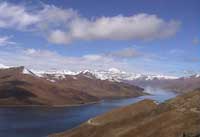 We leave the valley and start to wind up into the hills. The road is dusty and unpaved and is little more than a track as it slices through the yellow grassed hills. The air is thin as we gain altitude and looking out of the window of the Land Cruiser, it is as though we look out of an aeroplane, crossing the Middle East on the way to India, deserty scrub way down in the distance, hills and far off mountains. The crest of the pass is at 4860 metres. We jump out and take photographs and there below us on the other side of the pass is Nam Tso Lake. An awesome expanse of water that is shaped liked a scorpion. The road winds down to the lakeside and clings to it as far as the eye can see.
We leave the valley and start to wind up into the hills. The road is dusty and unpaved and is little more than a track as it slices through the yellow grassed hills. The air is thin as we gain altitude and looking out of the window of the Land Cruiser, it is as though we look out of an aeroplane, crossing the Middle East on the way to India, deserty scrub way down in the distance, hills and far off mountains. The crest of the pass is at 4860 metres. We jump out and take photographs and there below us on the other side of the pass is Nam Tso Lake. An awesome expanse of water that is shaped liked a scorpion. The road winds down to the lakeside and clings to it as far as the eye can see.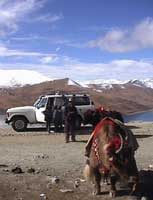
The water of Nam Tso is deep blue and turquoise and crystal clear. It works on three levels. We can see its clarity and depth and can see the bottom. Refocus and we can see the deep blue expanse, reflecting the cloudless sky above. And focus again and we see the reflections of the yellow hills and snowy peaks. And everywhere around is nothingness. The Lake District would once have had this feeling of natural wonder, before the jet skis and powerboats and scones and teashops, hotels and Kendal Mint Cake outlets ruined the place. The only sign of man (and a pretty ugly sign at that) are the electricity pylons that blot the landscape. But I am not about to deny the Tibetans progress and if the price of electricity is the loss of a tourist vista or two there is no problem. Only there is. Nothing is simple in Tibet. Nam Tso is a dead lake, in other words it is not filled by springs or rivers. Yet the Chinese have seen fit to tap it for hydroelectric power (as they have a wanton passion for- think of the three gorges dam), and are slowly draining it and altering the ecological balance of the marine environment for ever. Not that they give a shit. Following the lake around, to the south east of us in the distance we catch our first glimpse of the Himalaya. These are the daddyo mountains, none of the piddling little wannabes we saw in Kham, eastern Tibet. We've left the boys and are now approaching the men.
We take lunch at Nangaste. Unlike with Onedoi who would find us a cheap and clean restaurant, and eat with us, our guide plants us in the most expensive tourist joint whilst he and the driver find more local fare. He refuses to have it any other way. We are getting on like a house on fire and we've only been together for five hours. We've got five days with him.
 The people around here are different to those in Kham. They wear large fur hats, with shorter jackets and have darker skin. They walk with caravans of yaks, many of which have saddles on but we never see anyone riding a yak. These are real yaks, huge plodding hairy beasts that just look amusing. God (or for you non-believers, evolution) was having a laugh when he created the yak. Many of the yaks we'd assumed we'd seen in Kham I now realized were frauds. Cross breeds. We were now looking at the real McCoy. Our driver has now woken up somewhat, but this has given him a lust for his brake. He is anchor happy and we are regularly thrown forward as he skids and burns rubber to stop. At one stage this abrupt tyre burning slide is to avoid us speeding over the precipice that is in front of us as the road bends. Lindsey gasps and shouts at him to slow down.
The people around here are different to those in Kham. They wear large fur hats, with shorter jackets and have darker skin. They walk with caravans of yaks, many of which have saddles on but we never see anyone riding a yak. These are real yaks, huge plodding hairy beasts that just look amusing. God (or for you non-believers, evolution) was having a laugh when he created the yak. Many of the yaks we'd assumed we'd seen in Kham I now realized were frauds. Cross breeds. We were now looking at the real McCoy. Our driver has now woken up somewhat, but this has given him a lust for his brake. He is anchor happy and we are regularly thrown forward as he skids and burns rubber to stop. At one stage this abrupt tyre burning slide is to avoid us speeding over the precipice that is in front of us as the road bends. Lindsey gasps and shouts at him to slow down.
We pass through rocky terrain that reminds me of Wadi Rum in Jordan before coming into a large plain with villages and busy signs of agriculture. Horses and yaks walk around piles of golden harvested barley, trampling it underfoot. The richer farmers drive their tractors round in circles over it. I ask our guide what they are doing and he mumbles incoherently at me. I ask him again and he says' preparing barley'. I can see that! Are they threshing it? Separating the wheat or (in this case Barley) from the Chaff? (Is that the same as threshing?) All perfectly valid questions that our guide either does not want to answer or cannot answer.
We don't pay you to think
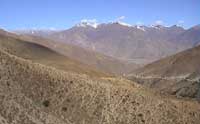 The landscape begins to resemble that of the moon and then we arrive in Gyantse. Gyantse has a very Tibetan feel to it. By Tibetan standards it is a large city; by ours it is a Mickey Mouse town that is half asleep in a haze of dust. Here the men sit about playing board games; in most other places in Tibet they hang around billiards tables, shooting pool and snooker and I'd love to go up to them and ask them, 'haven't they got jobs to be doing'. But they'd probably ask me the same question. An old fellow wanders up to me and peers in at my face. They do not share the same western concept of personal space here. So I've got this gnarly old dude with his faces inches away from mine, staring intensely at me and he stinks, but for a change not of yak butter and I'm uncomfortable because I'm being violated, my space is invaded. I decide he's not from these parts. He's got different eyes and wears different clothes, a large fur hat and I decide he is an Uighyur from the north west of China. Finally he loses interest me and wanders away which is good because the sight of his face, whilst interesting because it was different, was beginning to make me feel sick. His leathered face supported a thick, bushy moustache which in turn supported an ancient dried and crusty bogey that dribbled from his left nostril.
The landscape begins to resemble that of the moon and then we arrive in Gyantse. Gyantse has a very Tibetan feel to it. By Tibetan standards it is a large city; by ours it is a Mickey Mouse town that is half asleep in a haze of dust. Here the men sit about playing board games; in most other places in Tibet they hang around billiards tables, shooting pool and snooker and I'd love to go up to them and ask them, 'haven't they got jobs to be doing'. But they'd probably ask me the same question. An old fellow wanders up to me and peers in at my face. They do not share the same western concept of personal space here. So I've got this gnarly old dude with his faces inches away from mine, staring intensely at me and he stinks, but for a change not of yak butter and I'm uncomfortable because I'm being violated, my space is invaded. I decide he's not from these parts. He's got different eyes and wears different clothes, a large fur hat and I decide he is an Uighyur from the north west of China. Finally he loses interest me and wanders away which is good because the sight of his face, whilst interesting because it was different, was beginning to make me feel sick. His leathered face supported a thick, bushy moustache which in turn supported an ancient dried and crusty bogey that dribbled from his left nostril.
There is one main street in Gyantse, behind which, rising up on a hill is the great fort. There are only two ways up to it, the short way and the long way. Our guide sent us on the long way.
At the turn of the last century when the Great Game was at its height, with Russia and Britain playing spying games with each other, Tibet came to the fore as a strategically important pawn to be won. British spies mapped Tibet dressed as pilgrims, counting their footsteps using modified rosary beads. And then a mission was sent, led by a bloke called Younghusband to sort these damned Tibetans out once and for all. Things came to a crux at Gyantse and a battle was fought for the fort. Loads off Tibetans were killed with only a handful of British and Sepoy casualties. I get the feeling it wasn't the most fruitful of exercises, but it showed the Tibetans the might of the empire and his brief sojourn in Tibet had a profound spiritual effect on the old British Colonel. Younghusband who later set up the World Council of Churches.
 The fort was tiring to reach, but the view from the top was breathtaking. At its entrance was a museum about the Younghusband expedition. The sign above the door called it "The memorial hall of anti British." It was a room with a handful of objects from the time, spears from the Tibetan side and rifles from the British. Various dusty cabinets including one displaying 'Splinters of British troops' that appeared to be bits of shrapnel and a few fragments of bone. The boards telling the history in English were more interesting. Full of statements such as 'British imperialism' and references to the Chinese motherland. It can never occur to the Chinese that history repeats itself and they are now the imperialist aggressor who have reduced Tibet to their colony (as the board described the British and India). Indeed reading these boards the author had a very Chinese view of history, he commenced "Tibet is an [undecipherable] part of the motherland" and then later "to safeguard the sacred territory of the motherland those heroic Tibetan people added an immortal chapter to the annals of anti-invading wars." So when the Tibetans were fighting the British it was on behalf of the Chinese 'motherland'. Yeah right. There were numerous other untruths in this historical prose, including reference to a journalist who was shot dead. The man, Edmund Chandler, in fact returned to Britain to write best selling novels.
The fort was tiring to reach, but the view from the top was breathtaking. At its entrance was a museum about the Younghusband expedition. The sign above the door called it "The memorial hall of anti British." It was a room with a handful of objects from the time, spears from the Tibetan side and rifles from the British. Various dusty cabinets including one displaying 'Splinters of British troops' that appeared to be bits of shrapnel and a few fragments of bone. The boards telling the history in English were more interesting. Full of statements such as 'British imperialism' and references to the Chinese motherland. It can never occur to the Chinese that history repeats itself and they are now the imperialist aggressor who have reduced Tibet to their colony (as the board described the British and India). Indeed reading these boards the author had a very Chinese view of history, he commenced "Tibet is an [undecipherable] part of the motherland" and then later "to safeguard the sacred territory of the motherland those heroic Tibetan people added an immortal chapter to the annals of anti-invading wars." So when the Tibetans were fighting the British it was on behalf of the Chinese 'motherland'. Yeah right. There were numerous other untruths in this historical prose, including reference to a journalist who was shot dead. The man, Edmund Chandler, in fact returned to Britain to write best selling novels.
But it wasn't just the Memorial Hall of Anti British which was full of propaganda. Displays of torture and tax collection by the Tibetan landlords in the time before Chinese 'liberation' were clearly intended as a reminder to local visitors how bad the old times were. All this Chinese propaganda made me feel queasy, and with three o-clock looming, the time we'd agreed to meet our driver and guide, it was time to descend.
At the place we'd agreed to meet they were nowhere in sight. It was five past three. We hung around for half an hour; I walked around the town looking for them but to no avail. Then as four o-clock neared Nowan appeared. Like it was our fault he complained, saying "I thought you would walk to the monastery". To this I wanted to reply ;'s if I were a gangster in a film'. In a drawl, before nodding at a henchman who'd pull out his pistol and shoot him dead I'd say "I don't pay you to think. I pay you to..." but then realized I had no idea what we are paying him to do anyway. Certainly not guide, so the punch line would have been lost and I couldn't cuss him with my gangster line.
We took a look at the giant Stupa in the monastery from the gates, we decided it was too expensive to enter and we'd already seen our fair share of monasteries and Buddhas. We got back into the jeep and motored on. Nowan produced another euro pop tape, this time with 'No limits' and 'Barbie Doll' hurting our ears. It didn't last long; he didn't want another tape confiscated so he inserted a different one. Hindi film music. I never thought I'd see the day when I'd say Bollywood hits are preferable to western pop.
Panchen's Place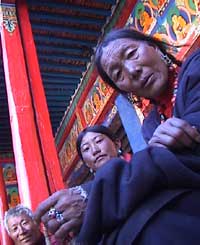
We drive to Shigatse. The road is flat and passes fields of recently harvested barley with livestock eating the stubble. By the houses barley is being trampled. With such intensity in the fields there is little traffic on the road. We pass the occasional horse and cart, or power tiller with trailer, but for the most part we have the road to ourselves. Or so we think. The driver slams on the brakes jettisoning us all forward and a little more of his already bald tyres are left on the tarmac. He jumps out and shouts at some children who peer over the gulley by the side of the road. They'd thrown something at the car as we passed.
At Shigatse we are taken to a dingy hotel. The receptionist knows Nowan and they have a conversation before letting us know the price. It was the sort of price that produces an involuntary vocal reaction of "how much?" The woman speaks English and I tell her that the room is far too expensive, "As expensive as Beijing" I say. "Arr," she replies, "you are in Tibet now. Everything has to come from China". Thank you bloody China I mutter. Gael is already telling Nowan we must find cheaper accommodation. "Then you must take taxi" he says. This is the limit. Lindsey tells him we are taking no taxi and Gael angrily points at the Land cruiser sitting outside, reminding our guide of how much we have paid for it and his services. And now his service will include finding us a cheaper hotel. "Everywhere else is closed" he moans. Bullshit! We find somewhere else.
The hotel we stay at resembles a building site, the sort of place that whinging couples video and tell all in consumer shows on TV back home. But for us, despite the smell of mastic and sound of drilling, it is probably the best place we've stayed in since coming to China and Tibet. As we enter our room, an electrician is putting the finishing touches to the console between the bed. It's all brand new and looks nice, but on closer inspection the workmanship is terrible. Shoddy finishing and you could have a field day going round doing the snagging.
The driver and guide are tired and grumpy in the morning. We returned to the hotel late after our meal and they were still out then. We crawl down the streets looking for a particular shop and stop outside it. Nowan rushes out and greets a shop assistant there. I presume he has gone to say a final goodbye to his karaoke partner from last night.
As we approach the Shigatse monastery, seat of the Panchen Lama, I am about to ask our guide about Buddhism and the Dalai Lama but think better of it. He is full of morning grumpiness, proving to be useless at answering questions anyway and it probably would not be in my interests to talk about the 'splitist' Dalai Lama. Nowan works, indirectly, for the government.
Shigatse is Tibet's second largest city which isn't saying much. Once it was dominated by the monastery here, but since the Chinese invasion and the Cultural Revolution, despite housing a few hundred monks, it has been reduced to little more than a museum relic. I'm interested to learn about what happened to the monastery during the Cultural Revolution and ask our guide. He chooses to ignore me. In several of the chapels we pass, we see monks piling balls of yak butter and pouring what looks like water over them. I ask our guide what they are doing and he doesn't know. We walk into a chapel that contains a huge Stupa that houses the relics of one of Panchen lamas. Our guide is able to tell how tall the Stupa is and how much gold covers it and I say to him "yeah, yeah, so you've swallowed the Chinese guide book, but you can't tell me anything that I really want to know".
As in all Tibetan monasteries, pictures of lamas are in great evidence. They are mostly of the previous tubby Panchen Lama, but there are also several of the young boy who is considered by the Chinese to be the lamas reincarnation. Traditionally it is the Dalai Lama who chooses the reincarnation of the Panchen Lama, effectively the number two position in Tibetan Buddhist hierarchy. The child chosen by the Dalai Lama was placed under arrest by the Chinese government and remains the world's youngest political prisoner. The Chinese then instructed the Shigaste clerics to choose a more acceptable child; their choice just happened to be the son of a Party Member.
Litter
Leaving Shigatse we picked up a picnic; polystyrene boxes of warm Chinese food. We drove across desert plains under a Big Sky, the sort of sky that is dotted with fluffy clouds and just seems to go on forever. A sky that is unknown in the UK, we just don't have the expanse for it. We stop by the roadside and walk down into a gulley where we eat lunch. The driver and guide just leave their rubbish where they sit and I am incensed. Have they got no consideration for their natural environment? Do they not know that polystyrene will not biodegrade? The driver snaps back at me and refuses to let me take the bag of rubbish into his car. Nowan explains that the road is well trodden by beggars who will pick up the rubbish and pick from our leftovers. I am forced to comply and we begrudgingly leave our litter by the roadside.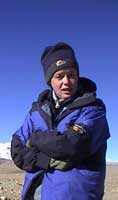
We continue driving through the desert, a great expanse of nothing but sand, scrub, wrinkled hills and snow dusted mountains in the distance. To begin with the hills are like dollops of coffee ice cream which the Creator dragged a fork down the side of to create uniform deep furrows. Later the hills lose their uniformity. They become like tribal witch's tits, shrivelled and saggy and jaundiced and leathery. Black shadows cast by the distant clouds are like black cancerous growth on these ancient boobs.
Its a lonely road we follow. And then we swerve to avoid a pair of post coitial dogs, their humping finished yet remaining attached at the genitals facing opposite directions seemingly unsure of what to do next. Of all the places to have a shag they chose the middle of the road, and now fused together they can't move off it.
The road climbs and twists and turns and it is cold, windy and bright. The land glows golden in the afternoon sun. We stop to take photographs and a convoy of new tractors rolls past us. Their drivers sit exposed to the elements, with bright red balaclavas over their faces and matching red bobble hats on their heads.
Pale Earth
I'd expressly stated in the office before we left that we would visit Sakya. I'd heard that the road was closed, but the travel agency assured us that yes, it would be no problem. We turned off the Friendship Highway and headed towards Sakya. After ten minutes we reached a road block and our guide casually told us that the road was impassable and we could not reach Sakya. "Bollocks" I politely said to him. "Are you telling me that the town of Sakya is effectively closed? No transport can get in or out of the town?"
"Let me ring the office" he replied.
"Yeah you do that. I tell you matey, we are going to Sakya this afternoon. You've got a four wheel drive and you are going to use it to get us there." He dialled but couldn't get through. Before an argument could flare up, I spotted in the distance a couple of Lorries following the dried up river bed. I pointed to them, "where do you think they are coming from?" The driver whinged in Tibetan, but we were standing no nonsense from him or the guide. He drove down into the river bank and followed it to Sakya.
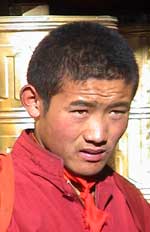 Sakya means "pale earth" (although the guide tried to tell me something else. In this instance I was more prepared to believe the Lonely Planet). Rather than being white washed, the houses are painted grey here. The town was very Tibetan, and dominated by the immense grey walls of the monastery. As we entered it we were accosted by a lay man who demanded payment for entry tickets. We negotiated a three for the price of two deal. We entered a large dark hall where a couple of monks were polishing items. They showed us the musical instruments and a large multi-coloured sand mandala. They had innocent smiles and were easy to get on with despite speaking no English. The younger one walked us up to the monastery ramparts, and we looked down at the town's people trampling their barley. The wind was picking up as we left the monks. I flew our kite on an empty grassy expanse of land. Local snotty nosed children gathered and watched, laughing as the kite pulled me in the strong gusts. I let a couple of them help me fly it and they had great amusement as we flew it towards a young girl walking back from the fields- she ran away in terror!
Sakya means "pale earth" (although the guide tried to tell me something else. In this instance I was more prepared to believe the Lonely Planet). Rather than being white washed, the houses are painted grey here. The town was very Tibetan, and dominated by the immense grey walls of the monastery. As we entered it we were accosted by a lay man who demanded payment for entry tickets. We negotiated a three for the price of two deal. We entered a large dark hall where a couple of monks were polishing items. They showed us the musical instruments and a large multi-coloured sand mandala. They had innocent smiles and were easy to get on with despite speaking no English. The younger one walked us up to the monastery ramparts, and we looked down at the town's people trampling their barley. The wind was picking up as we left the monks. I flew our kite on an empty grassy expanse of land. Local snotty nosed children gathered and watched, laughing as the kite pulled me in the strong gusts. I let a couple of them help me fly it and they had great amusement as we flew it towards a young girl walking back from the fields- she ran away in terror!
Eating options were strictly limited in Sakya. We ate in a restaurant that backed onto the monastery. It worried me that when I peeked into the kitchen I saw monks milling about; I didn't fancy much for their cooking skills! The following morning my fears about the place were confirmed when I saw the cook leaving the kitchen and refuelling the stove in the dining area. She took a handful of yak dung fuel and threw it into the stove, and wiped her hands on her pinafore as she returned to the kitchen. So that is why Onedoi had said we should avoid Tibetan restaurants. Once again we were glad for the jar of marmite.
In the evening we had fried rice. We were watched throughout by a young man dressed in a once smart suit, now dirty and worn, yet still with the original label on the sleeve. As we ate, a couple of scruffy children entered the room with a plastic bag and scavenged from each of the dining tables.
Filth
The room we stayed in was probably the worst on the whole trip. It was more like a stable than a room. 12 foot square it had four uncomfortable thin single beds with mattresses whose springs had long since given up the ghost. The sheets were stained and unwashed. In the middle of the room were two small painted tables. Tibetan furniture is often beautifully and colourfully painted and these tables were once fine examples of the style. But like the mattresses they had seen better days. The room was on the first floor, accessed by a rickety wooden staircase and verandah. The door, which opened onto the verandah, was crude; a few planks nailed together with opened up cigarette cartons stuck over the holes. It had no lock, just a heavy beam that was propped behind the door to wedge it shut. Next to the door was the window; thin picture glass held in place with nails rattling in the wind. One pane was broken and the wind howled through. I stuck a plastic bag over the hole to block it up. The bag crinkled loudly in the wind.
The lower half of the roughly plastered mud brick walls were painted pale blue. At waist height was a painted border of red, yellow and green (Rastafarian colours Lindsey commented) and another decorative border just below the ceiling which was covered in cobwebs. It would have looked good when it was first painted, but was now dirty and in need of redoing. Particularly so in the corner by the door with mouldy spit stains climbing up it, and a filthy rotting patch in the grimely green felt carpet. Lindsey was not amused; I however considered it to have a certain ancient rustic charm about it. What we both considered unbearable was the smell. Walking into the room we were hit by a noxious odour of yak butter. The room had never been cleaned. Still, it was our abode for the night, billed in the book at the best hotel in Sakya. We laid our sleeping bags out, put towels over the rank pillows and soon got used to the smell and the howling wind became a lullaby that soothed us to sleep.
Getting up to use the toilet in the middle of the night presented little problem. We went local style, doing it on the courtyard. The toilet itself was hard to find and was just a hole in the ground. For a change it had a more acceptable smell of manure than the usual stench of toilets in Tibet. The next morning we brushed our teeth, packed and were ready to go. There wasn't a shower around for over a hundred square miles.
Somehow our driver and guide had managed to find a Chinese karaoke bar and were characteristically grumpy and tired in the morning. It took a while before we were back on the road. Today was to be our assault on Everest.
First left, follow the road down through the valley and it's the tall one on the left. You can't miss it!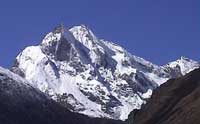
We stopped at Shegar, a nondescript one street town with children begging and men hanging around shooting pool. It didn't have a good vibe. We were dropped off outside 'Restaurant Number One,' a place that seemed very pro-Chinese. Taking central spot on the main wall inside, where you would usually expect to see a poster of the Potala Palace or Panchen Lama (once it would have been the Dalai Lama but his photograph is illegal in Tibet) there was a poster with the faces of Mao and Deng Xiaoping and Zhemin benignly staring down at us. The poster was framed by white silk scarves which are given as a sign of respect in the same way we would shake a dignitary's hand. I wasn't surprised our guide had dropped us off here. Clearly they see a lot of tourists passing through here- it was the turn off to Everest Base Camp and they hike their prices accordingly. The staff were grumpy and rude, but not dishonest. Gael argued passionately with them and refused to pay for a tea that was over priced and had not been drunk. He walked out without paying. Just before we drove off, the man he'd argued with rushed out carrying his camera. Gael had left it behind on his chair.
As we ate noodles a petite blonde girl with perfect bronzed skin walked in and approached us. She was dazzlingly beautiful. Dutch, she was cycling around Asia with her boyfriend. They didn't fancy the return trip to Base Camp on two wheels- could they join us? No problem we said if they paid their share. We announced our intentions of letting the Dutch hitch hikers join us to Nowan. Without a moment's thought he refused. No, we couldn't pick up hitch hikers.
"So we ring your office," growled Gael. He was informed that provided they had valid permits of course we could take them. The driver was unhappy because the Dutch couple wanted to put the bikes on the roof of the land cruiser. "If your cycles damage the vehicle you pay" says Nowan. "Yeah, and if your vehicles damages our cycles you pay" says Kim, jabbing Nowan in the chest.
Whilst Elizabeth was petite, her boyfriend Kim was tall and gangly and towered over the Tibetans. This he used to his advantage, jokingly pushing them around, and his infectious humour that he almost forced onto people, made light of any tricky situation.
 The road to Everest was rough yet beautiful. As we pulled up on the Chola pass we caught our first glimpse of the tallest mountain in the world. The wind was fierce on the pass; the prayer flags attached to the Stupa which mark the highpoint of every pass were flapping violently. The wind was not constant in direction, rather changing from east to north to west. I was desperate for a pee and found a boulder to go behind. I stood relieving myself, facing Everest. Possibly the finest view you could wish to wee in front of .I stood open mouthed in awe and wonder. And then the wind changed direction and gusted from beneath me and towards me, redirecting my gushing torrent not so much on my trousers and feet, but upwards so my face was splattered and my open mouth was breached!
The road to Everest was rough yet beautiful. As we pulled up on the Chola pass we caught our first glimpse of the tallest mountain in the world. The wind was fierce on the pass; the prayer flags attached to the Stupa which mark the highpoint of every pass were flapping violently. The wind was not constant in direction, rather changing from east to north to west. I was desperate for a pee and found a boulder to go behind. I stood relieving myself, facing Everest. Possibly the finest view you could wish to wee in front of .I stood open mouthed in awe and wonder. And then the wind changed direction and gusted from beneath me and towards me, redirecting my gushing torrent not so much on my trousers and feet, but upwards so my face was splattered and my open mouth was breached!
The sky was crystal clear when we pulled up at Everest Base Camp. Not a cloud to block the view. We looked up at the North Face; we were at the foot of this awesome, yet deadly mountain. Looking up, it didn't seem so high. Maybe that is because we were already standing at 5000 metres. I fancied a crack at it that afternoon- scaling it looked like it would be a breeze. Ha! Every year Everest claims more than a few people who attempt to conquer her. The cold was intense, with a wind chill factor that must have been in the minus teens. I held our camera in my bare hands trying to take photos but my hands froze and I could not move them. I could but only imagine the wind at the top of the mountain.. Anything that is not firmly frozen down up there will be blasted off by the jet stream wind. The bitter cold drove us away from Base Camp. We'd been, we'd seen and we had the photos in the bag.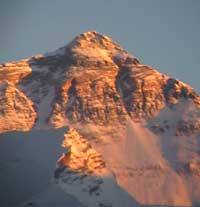
We stayed at Ronghpo monastery, billed as the worlds highest. But it wasn't really the monastery we stayed in, rather a guest house that was attached to it. The staff were every bit as rude and unpleasant as Everest was high and breath taking. No sooner had we entered, a lackey approached us and demanded an extortionate fee for a bed. Not even Kim could get this surly man to smile. His mantra was not so much 'om mani padme hum' as 'om money money money'.
We shared a room with Kim and Elizabeth. The room was filthy and had never been cleaned. This was evident when we moved the beds around so they would all face the window. Rubbish and inches of dust was piled high under them.
With the altitude and the intense cold, sleep that night was difficult. Lindsey particularly found it hard and woke me up on a couple of occasions in tears. In the morning I propped myself upon the bed, got wrapped up in my sleeping bag and blankets and rubbed the ice off the window panes. A few kilometres away the sun was breaking through and casting a glimmer of golden light over Everest. Despite the horribleness of our immediate surroundings it is a sight I will savour for a long time.
Takes our breath away
 The old road from Ronghpu to Tingri must rate as one of the worlds most beautiful, if not the most beautiful. It cuts through golden rocky landscape before emerging on a vast sloping plain of gravel, surrounded by sandy hills. Maybe it was the day we drove it that made it so breathtaking. There was not a cloud in the sky which was blue. A deep, saturated blue, the blue of the Virgin Mary, a holy blue. With little atmosphere above us, its magnificence was accentuated. And the hills. Every shade of brown, with hues of red and yellow and black. Golden yellow sand dunes and icy peaks jutting up from behind. It was cold. The streams had frozen over; as we drove over them we smashed and cracked the ice to reveal crystal clear water flowing beneath. The landscape was truly desolate but awesome. The only sign of life was the occasional rodent scuttling from hole to hole, and the odd eagle soaring above, watching out for dinner. The air was dry and it almost hurt to breathe. We drove on, past the odd hamlet; what sustains these people up here I thought? And always looming round every bend, towering above us were the spectacular peaks of the Himalaya.
The old road from Ronghpu to Tingri must rate as one of the worlds most beautiful, if not the most beautiful. It cuts through golden rocky landscape before emerging on a vast sloping plain of gravel, surrounded by sandy hills. Maybe it was the day we drove it that made it so breathtaking. There was not a cloud in the sky which was blue. A deep, saturated blue, the blue of the Virgin Mary, a holy blue. With little atmosphere above us, its magnificence was accentuated. And the hills. Every shade of brown, with hues of red and yellow and black. Golden yellow sand dunes and icy peaks jutting up from behind. It was cold. The streams had frozen over; as we drove over them we smashed and cracked the ice to reveal crystal clear water flowing beneath. The landscape was truly desolate but awesome. The only sign of life was the occasional rodent scuttling from hole to hole, and the odd eagle soaring above, watching out for dinner. The air was dry and it almost hurt to breathe. We drove on, past the odd hamlet; what sustains these people up here I thought? And always looming round every bend, towering above us were the spectacular peaks of the Himalaya.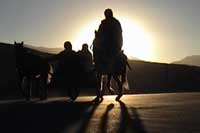
As we neared Tingri there was more sign of life. Old men sitting on carts, pulled by donkeys or ponies. Low slung carts with large old fashioned pram wheels that looked like the contraptions that children in the fifties made and called go-karts. I switched the mode on our camera to 16:9 so it recorded our film in cinema postbox format. The new format brought a new look to the scenery, it looked everything like the landscape out of a spaghetti Western. You almost expected Clint to trot into town. Only Clint never rode against a back drop of Lhotse and Everest and a broad wash of Himalaya in the distance.
Tingri had a Wild West feel to it. The town was no more than the road that it clung to. Snotty children begged whilst a group of grown men danced to Hindi pop music. We stayed in a clean hotel that had a hot shower. It was luxury.
The eye of the tiger
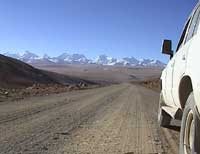 The early morning brought a pink haze in the horizon, the sun braking through in the distance in the same way it does when you look out of a plane. This was our final day, by nightfall we would be in Katmandu. Nowan clearly wanted to leave us on a high, and from nowhere pulled out a tape with surprisingly good (I use the term lightly) music. A bit of Boney M and then, out of the blue, Survivor's 'Eye of the Tiger'. I wanted to jump out of the car and run behind it, shadow boxing a la Rocky.
The early morning brought a pink haze in the horizon, the sun braking through in the distance in the same way it does when you look out of a plane. This was our final day, by nightfall we would be in Katmandu. Nowan clearly wanted to leave us on a high, and from nowhere pulled out a tape with surprisingly good (I use the term lightly) music. A bit of Boney M and then, out of the blue, Survivor's 'Eye of the Tiger'. I wanted to jump out of the car and run behind it, shadow boxing a la Rocky.
We passed our last cutesy mountain goats and hairy yaks and then the road descended, plummeting from the Tibetan Plateau towards the plains of India. The landscape rapidly changed from desert and rock and snow and ice to lush greenery hugging steep rocky slopes. We drove through a tunnel, round a sharp bend and stopped. The driver and guide walked to the bend and looked down the precipitous drop down to the fast running water below. We joined them. Several hundred feet below a white car lay on its roof. Concertinaed, the occupants of it must be dead. Not so said Nowan. It was the driver's brother who was in it. He was driving at night in the dark, and at this bend decided he wanted to go no further and attempted to do a three point turn. But the fool didn't see the edge and plummeted down the cliff. Miraculously he crawled out with a few scratches on his arm.
The road passed under a waterfall. We stopped before it then drove slowly under it. Natural car wash the Tibetan style!
Early in the afternoon we were at the border. We were accosted by a horde of touts with fat wads of Nepalese rupees offering to change money. The restaurant, our guide deposited us in. was expensive; we walked around to find another, cheaper feeding hole. I wandered in to what I thought was a restaurant but was in fact a "Steam Bath". A dolled up woman with Nepalese looks brushed up close to me and whispered in my ear "special massage." "Urrrr, no thanks!"
Our final eating experience in Tibet was in a grotty joint. A large room with one half partitioned off with a dark and dingy kitchen. As I looked on at a woman hanging over the single wok I reflected that it would be futile to be vegetarian in China and Tibet, as it is all cooked in the same pan. Roll on vegetarianism in Nepal and India! The other half of the room was for dining. The decor was naff, with a wooden laminate to the waist then a purple velvet wall covering to the ceiling. As in so many eastern restaurants, there were stylized pictures of the eastern idea of western food. There was a television in the far corner. A voltage stabilizer sat on top of it. The nine other customers in the restaurant fixed their eyes on the Bollywood B-movie that was playing. There was little in the way of dialogue, just a screeching distorted soundtrack. It was more like a silent movie and took little effort to follow. Lindsey and Gael were soon engrossed in it. I got our passports and photographs for the Nepalese visa together. I wondered what would happen if you left China and rolled up at the border with Nepal without photographs. With no valid visa for China you could not return to Tibet. What would you do? Be forever condemned to living in no-mans land?
Our passports were stamped and we were leaving Tibet. Our last contact was unsurprisingly with a Chinese man from Guangzhou province. As he checked our passports were all in order he smiled, "how long have you been in Tibet?" he asked us in perfect English. "Almost a month" I replied. His face dropped. "Why so long? This is a dreadful place. I can't wait to return to Guangzhou". Pity his government doesn't hold the same sentiments I thought. I wished him well and then we were on our way down to the friendship bridge and the Nepalese border.
